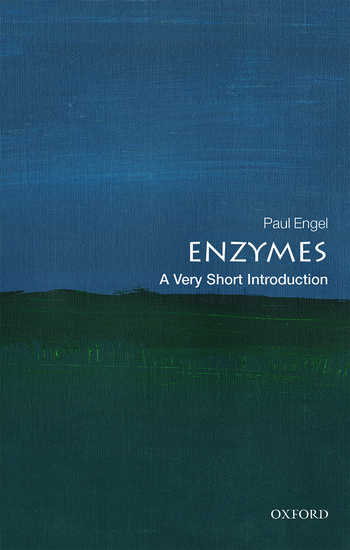Home >
A Very Short Introduction >
Enzymes (Medical)
A Very Short Introduction | Medical
Enzymes
ISBN: 9780198824985
Series: A Very Short Introduction
Enzymes (Medical)
A Very Short Introduction Enzymes (Medical) Media > Books > Non-Fiction > Education Books Expect Delays of Up to 4 Weeks| Order Below |
ISBN
9780198824985 (10-digit ISBN: 019882498X)
- Description
- Key Features
- Series Description
- Table of Contents
- Explains what enzymes are, what they do and how they do it
- Considers the role of enzymes both in our bodies and cells, and also as tools in washing powders, food production, waste treatment, and chemical synthesis
- Describes contemporary applications of cloned enzymes for a multitude of industrial and medical uses
Enzymes are the astonishing, tiny molecular machines that make life possible. Each one of these small proteins speeds up a single chemical reaction inside a living organism many millionfold. Working together, teams of enzymes carry out all the processes that collectively we recognise as life, from making DNA to digesting food.
This Very Short Introduction explains the why and the how of speeding up these reactions - catalysis - before going on to reveal how we have evolved these catalysts of such extraordinary power and exquisite selectivity. Paul Engel shows how X-ray crystallography has revealed the complex molecular shapes that allow enzymes to function at an extraordinarily sophisticated level. He also examines medical aspects of enzymes, both in the way faulty enzymes cause disease and in the way enzymes can be used for diagnosis and therapy. Finally, he looks at the many varied ways in which individual enzymes, taken out of their biological context, are used nowadays as tools - in washing powders, food production, waste treatment, and chemical synthesis.
Oxford's Very Short Introductions series offers concise and original introductions to a wide range of subjects--from Islam to Sociology, Politics to Classics, Literary Theory to History, and Archaeology to the Bible.
Not simply a textbook of definitions, each volume in this series provides trenchant and provocative--yet always balanced and complete--discussions of the central issues in a given discipline or field. Every Very Short Introduction gives a readable evolution of the subject in question, demonstrating how the subject has developed and how it has influenced society. Eventually, the series will encompass every major academic discipline, offering all students an accessible and abundant reference library.
Whatever the area of study that one deems important or appealing, whatever the topic that fascinates the general reader, the Very Short Introductions series has a handy and affordable guide that will likely prove indispensable.
Please note: As this series is not ELT material, these titles are not subject to discount.
Acknowledgements
List of illustrations
1:No enzymes, no life
2:Making things happen
3:Making things happen
4:Nuts and bolts
5:Molecular machines
6:Metabolic pathways and enzyme evolution
7:Enzymes and disease
8:Enzymes as tools
Further reading
Index
Enzymes are the astonishing, tiny molecular machines that make life possible. Each one of these small proteins speeds up a single chemical reaction inside a living organism many millionfold. Working together, teams of enzymes carry out all the processes that collectively we recognise as life, from making DNA to digesting food.
This Very Short Introduction explains the why and the how of speeding up these reactions - catalysis - before going on to reveal how we have evolved these catalysts of such extraordinary power and exquisite selectivity. Paul Engel shows how X-ray crystallography has revealed the complex molecular shapes that allow enzymes to function at an extraordinarily sophisticated level. He also examines medical aspects of enzymes, both in the way faulty enzymes cause disease and in the way enzymes can be used for diagnosis and therapy. Finally, he looks at the many varied ways in which individual enzymes, taken out of their biological context, are used nowadays as tools - in washing powders, food production, waste treatment, and chemical synthesis.
Key Features
- Explains what enzymes are, what they do and how they do it
- Considers the role of enzymes both in our bodies and cells, and also as tools in washing powders, food production, waste treatment, and chemical synthesis
- Describes contemporary applications of cloned enzymes for a multitude of industrial and medical uses
Series Description
Oxford's Very Short Introductions series offers concise and original introductions to a wide range of subjects--from Islam to Sociology, Politics to Classics, Literary Theory to History, and Archaeology to the Bible.
Not simply a textbook of definitions, each volume in this series provides trenchant and provocative--yet always balanced and complete--discussions of the central issues in a given discipline or field. Every Very Short Introduction gives a readable evolution of the subject in question, demonstrating how the subject has developed and how it has influenced society. Eventually, the series will encompass every major academic discipline, offering all students an accessible and abundant reference library.
Whatever the area of study that one deems important or appealing, whatever the topic that fascinates the general reader, the Very Short Introductions series has a handy and affordable guide that will likely prove indispensable.
Please note: As this series is not ELT material, these titles are not subject to discount.
EASY ORDER FORM
PRICES LISTED INCLUDE CONSUMPTION TAX
Price Before Tax:
¥1,790


